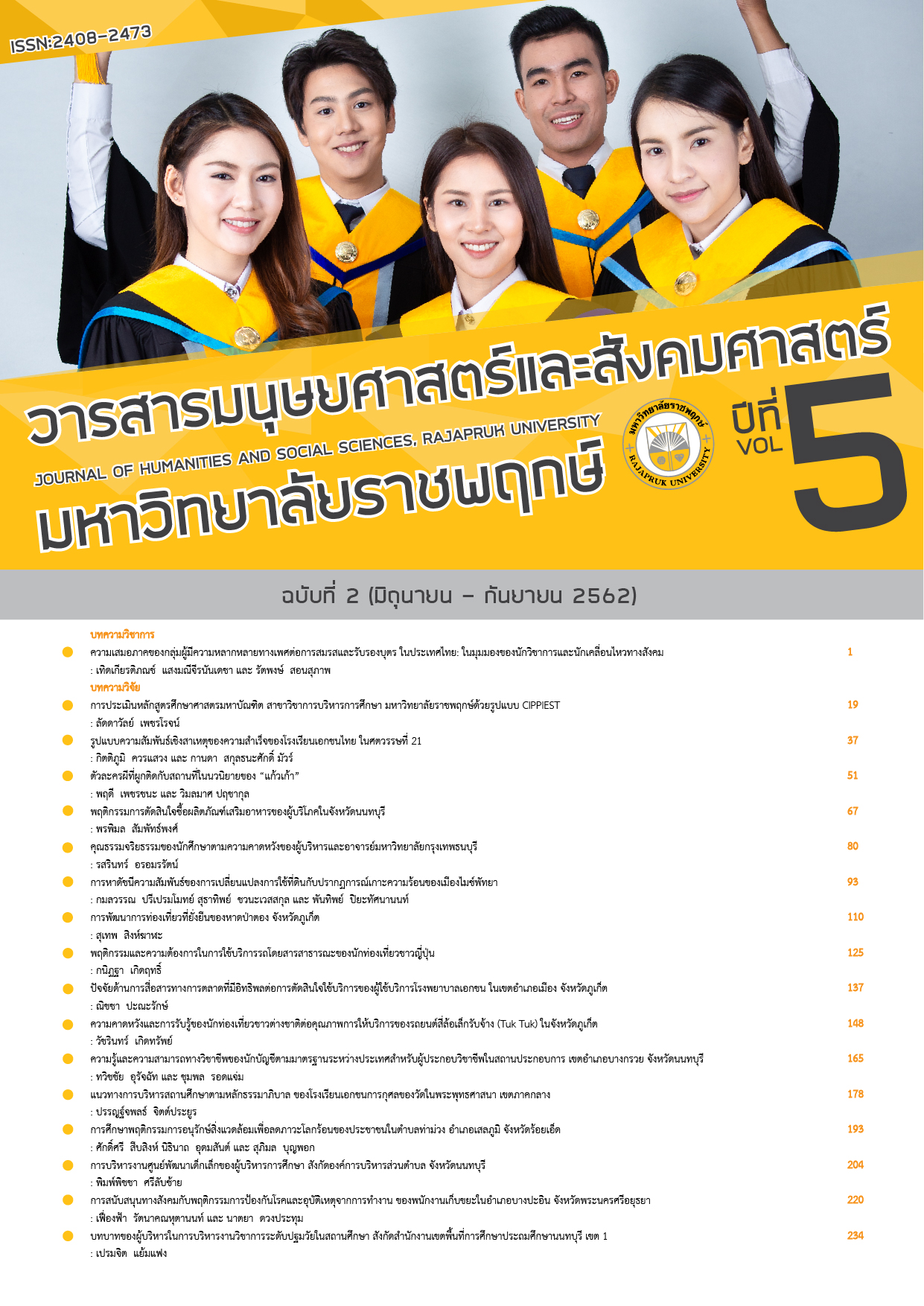Evaluation of Curriculum in Master of Education Program in Educational Administration Rajapruk University Using CIPPIEST Model
Main Article Content
Abstract
The objectives of this research were to evaluate the characteristics and evaluate the context, input, process, product, impact, effect, sustainability, and transportability of the teaching and learning systems of the Master of Education Program in Educational Administration at Rajapruk University. The sample was comprised of 77 persons including instructors, master graduates and master graduate employers. The data was collected by questionnaires and interview forms which were analyzed using frequency, percent, mean, standard deviation and content analysis. The research results found that as following: 1. Evaluation results, of the Master of Education Program in Educational Administration from master graduates, rank the highest in the subject of theories and educational administration principles. They had opportunity and progress in working, were able to work hard, and had critical, synthesis, and creative thinking skills. They could also adapt themselves and were efficient in communication. The motivation and satisfaction to study at Rajapruk University was influenced the famous qualities and advice of the instructors. The master graduate employers evaluated that the characteristics ranked highest were morals and ethics, followed by responsibility, inter-personal skills, having a volunteering mindset and concern for social development, having knowledge, ability, and intellectual skills, and a high level in numerical analysis, communication and using information skills. 2. The result from the context and input evaluation showed that the context had been situation and most instructors had a Ph.D. and held an academic rank as an associate professor. The process results emphasized in theories and strengthening leadership practices. The product evaluation showed that all students made a thesis, presented at the journal/national conference and had the highest satisfaction in learning and teaching system. The effective of outcome evaluation was all master graduates got jobs. The impact evaluation was that some graduates had a higher work position and continued their education with a Ph.D. at a government university. The work was sustainable by having an e-learning online program. The transportation was dispread using technology in the MBA and MPA programs.
Article Details
References
rtu.ac.th/doc/Degree_certificate.pdf
จรรยา ดาสา และคณะ. (2553). การประเมินและติดตามผลหลักสูตรการศึกมหาบัณฑิต สาขาวิทยาศาสตรศึกษา (แผน ข) มหาวิทยาลัยศรีนครินทรวิโรฒ. รายงานการวิจัย มหาวิทยาลัยศรีนครินทรวิโรฒ.
ทวีศักดิ์ จินดานุรักษ์. (2559). ครูวิทยาศาสตร์มืออาชีพ. วารสารอิเล็กทรอนิกส์การเรียนรู้ทางไกลเชิงนวัตกรรม. 6(1) มกราคม – มิถุนายน 2559. ค้นเมื่อ 12 ธันวาคม 2559, จาก http://e-jodil.stou.ac.th
ทีปทัศน์ ชินตาปัญญากุล และคณะ. (2560). การประเมินหลักสูตรแนวใหม่: รูปแบบ CIPPIEST. วารสารพยาบาลตำรวจ. 9(2) กรกฎาคม – ธันวาคม 2560: 203-212.
มาเรียม นิลพันธุ์. (2554). การประเมินหลักสูตรปรัชญาดุษฎีบัณฑิต สาขาวิชาหลักสูตรและการสอน. คณะศึกษาศาสตร์ มหาวิทยาลัยศิลปากร.
รัตนะ บัวสนธ์. (2556). รูปแบบการประเมิน CIPP และ CIPPIEST มโนทัศน์ที่คลาดเคลื่อนและถูกต้องในการใช้. วารสารศิลปากรศึกษาศาสตร์วิจัย. 5(2) กรกฎาคม – ธันวาคม 2556:
7 - 24.
ลัดดาวัลย์ เพชรโรจน์. (2556). การประเมินผลการจัดการเรียนการสอนผ่านระบบการจัดชั้นเรียนออนไลน์ด้วยโปรแกรม Class Start ระดับบัณฑิตศึกษา มหาวิทยาลัยราชพฤกษ์. รายงานการวิจัย มหาวิทยาลัยราชพฤกษ์.
ศิริชัย กาญจนวาสี. (2556). รูปแบบการประเมินโครงการ. ศูนย์ทดสอบและประเมินเพื่อการพัฒนาการศึกษาและวิชาชีพ คณะครุศาสตร์ จุฬาลงกรณ์มหาวิทยาลัย.
สำนักงานคณะกรรมการการอุดมศึกษา. (2552). กรอบมาตรฐานคุณวุฒิระดับอุดมศึกษาแห่งชาติ พ.ศ. 2552. ค้นเมื่อ 2 ตุลาคม 2557, จาก http http://www.mua.go.th/users/tqf-hed/.
สุชาดา นันทะไชย และคณะ (2555) การประเมินหลักสูตรศึกษาศาสตรดุษฎีบัณฑิต สาขาวิชาการบริหารการศึกษา. ภาควิชาการศึกษา คณะศึกษาศาสตร์ มหาวิทยาลัยเกษตรศาสตร์.
Buosonte, R. (2012). Evaluation Model CIPP and CIPPIEST: Misconception and correctness. Silpakorn Educational Research Journal, 5(2) July-December 2013. (in Thai)
Chintapanyakun, T. (2017). THE NEW CURRICULUM EVALUATION: CIPPIEST MODEL. Journal of The Police Nurse. 9(2) July - December 2017: 203 - 212. (in Thai)
Dasa, J. et al. (2010). An Evaluation and Follow up of Master of Education in Science Education (Plan B) Program. Srinakharinwirot University. (in Thai)
Ghavifekr, Simin and Wan Rosdy, Wan Athirah. (2015). Teaching and Learning with Technology: Effectiveness of ICT Integration in Schools, International Journal of Research in Education and Science. 1(2) Summer 2015.
Jindanuruk, T. (2016). Professional Science Teachers http://e-jodil.stou.ac.th. 6(1), January – June 2016: 159. (in Thai)
Kanjanawasi, S. (2013). Model of Project Evaluation. Center of Testing and Evaluation for Educational Development and Profession. Faculty of Education, Chulalongkorn University. (in Thai)
Loveless A, and Williamson. (2013). Learning Identities in Digital Age: Rethinking Creativity, Education and Technology, London/New York: Routledge.
Nanthachai, S. et al. (2012). The Evaluation of Philosophy Doctor of Education in Educational Administration. Department of Education Kasetsart University. (in Thai)
Nilphan, M. (2011). the Evaluation of Philosophy Doctor of Education in Curriculum and Teaching Educational, Faculty of Education, Silpakorn University. (in Thai)
Office of the Higher Education Commission. (2009). Thailand Qualifications Framework for Higher Education B.E. 2552. Retrieved on 2nd October, 2014, from http://www.mua.go.th/users/tqf-hed/. (in Thai)
Petchroj, L. (2013). Evaluation of Teaching and Learning through the Online Classes by Class Start for Graduate Level Program at Rajapruk University. Research report, Rajapruk University. (in Thai)
Pineida, Felipe, O. (2011). Competencies for the 21th Century: Integrating ICT to life, Social and Economical of Development. Procedia-Social and Behavioral Sciences. 28, 2011: 54 - 57.
Schiro, Michael. Stephen. (2008, 2013). Curriculum Theory: Conflict Vision and Enduring Concerns. Thousand Oaks, California: Sage Publications.
Stufflebeam and Shinkfield. (2007). CIPP Evaluation Model. Retrieved on 13th June 2015, from www.wmich.edu/evalctr/checklists
Stufflebeam, Gulickson and Wingate. (2002). The Spirit of Consuelo: An Evaluation of Ke Aka Ho’ona. The Evaluation Center, Western Michigan University.
The Teachers’ Council of Thailand. (2014). Announcement of the Teachers Council of Thailand Subject Certification of degrees and educational certificates for professional practice, 2014, Retrieved on 12th December, 2016, from http://alumni.rtu.ac.th/doc/Degree_certificate.pdf. (in Thai)
Williamson, Ben. (2013). The Future of The Curriculum: School Knowledge in The Digital Age. Massachusetts Institute of Technology, Retrieved on 13th June 2015, from http://www.mua.go.th/users/tqf-hed/.


